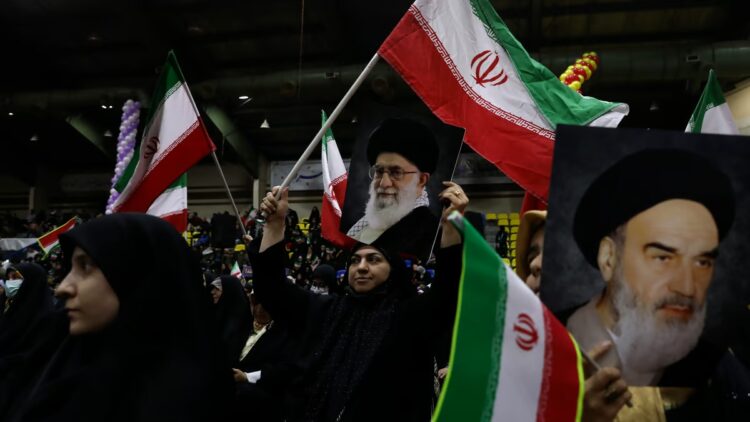Many Iranians are fed up with the country’s instability, weak economy, and potential low participation for the parliamentary elections
This Friday is Iran’s parliamentary elections; however, the real issue may not be who wins but rather how many people actually cast ballots.

Many individuals have privately said they won’t vote in this election due to widespread dissatisfaction with the collapsing economy, years of nationwide demonstrations that shook the nation, tensions with the West over Tehran’s nuclear program, and Iran’s backing for Russia in its war on Ukraine.
While officials have encouraged voters to cast votes, it is noteworthy that the state-owned polling place ISPA has not issued any information this year on anticipated turnout, which has been a consistent aspect of previous elections.
Just five of the twenty-one Iranians The Associated Press recently spoke with said they will cast ballots. Three said they were unsure, and thirteen indicated they wouldn’t.
Fearing retaliation, Amin, a 21-year-old university student, revealed only his first name. “If I protest about some shortcoming, many police and security agents will try to stop me,” he claimed.
“But if I die from hunger on the corner of one of the main streets, they will show no reaction.”
The Islamic Consultative Assembly, the 290-member parliament, has almost 15,000 candidates running for seats. There are five seats set aside for Iran’s religious minorities, and terms are for four years.
By legislation, the parliament votes on treaties, oversees the executive branch, and deals with other matters. In reality, Ayatollah Ali Khamenei, Iran’s supreme leader, has all authority.
For the last 20 years, hardliners have ruled the parliament, often issuing “Death to America” cries from the floor.
Under parliament speaker Mohammad Bagher Qalibaf, a former general of the Revolutionary Guard who had backed a bloody crackdown on Iranian university students in 1999, the legislature in 2020 advanced a bill that significantly reduced Tehran’s collaboration with the International Atomic Energy Agency, the UN’s nuclear watchdog.
This came after the United States withdrew from Iran’s nuclear agreement with other countries unilaterally under then-President Donald Trump in 2018. This action caused years of tensions in the Middle East and allowed Iran to enrich enough uranium at a record-breaking purity to have enough fuel for “several” nuclear weapons, should it choose to do so.
The required headscarf, or hijab, in Iran has been a topic of discussion in the parliament in recent times. This is because Mahsa Amini, 22, died in police custody in 2022, sparking demonstrations throughout the country.
Protests soon turned into demands for the removal of Iran’s Islamic government. Following it, there was a security crackdown that resulted in over 500 deaths and over 22,000 arrests.
In recent weeks, calls for a boycott of the elections have gained traction. Women’s rights campaigner and Nobel Peace Prize recipient Narges Mohammadi, who is now imprisoned, termed the calls a “sham.”
“The Islamic Republic, with its ruthless and brutal suppression, the killing of young people on the streets, the executions and the imprisonment and torture of men and women, deserves national sanctions and global disgrace,” Mohammadi stated in a news release.
The administration is under further pressure as a result of the boycott demands since Iran’s theocracy has relied on voter participation for part of its legitimacy since the Islamic Revolution of 1979.
Khamenei personally called on voters to cast ballots on Wednesday, calling it a responsibility of the country. “There is no reasoning behind not voting,” he said. “It does not solve any problem of the country.”
He said that “those who express a lack of interest in the election and encourage others not to participate should think some more.”
“If the election is weak, all face harm,” he said.
Despite conducting electoral polls in October, ISPA, the polling agency, has not released its findings. Politicians’ and other media sources’ figures point to a about 30% turnout.
The turnout in the 2021 presidential election, which hardliner Ebrahim Raisi won, was 49%, the lowest ever for a presidential election. Millions of votes were ruled invalid, most likely from those who felt compelled to vote but chose not to do so.
The turnout for the 2019 parliament race was 42%.
In addition, Iranians will cast ballots on Friday for representatives to the 88-seat Assembly of Experts, an eight-year term on an elite body tasked with selecting the nation’s next supreme leader after 84-year-old Khamenei.
Hassan Rouhani, the previous president of Iran and a relative moderate whose administration Iran reached the 2015 nuclear agreement with foreign powers, is not allowed to run in that campaign.
According to others who talked with the AP, they are avoiding the polls because of Iran’s economic problems. According to reports, young Iranians are unemployed at a rate of 20% and inflation is over 50%.
Hashem Amani, a 55-year-old fruit vendor in southern Tehran, said, “I will not cast a ballot.” I voted for Raisi to be president in 2021 in the hopes that like-minded individuals in the administration would cooperate and improve my quality of life. All I received in exchange was skyrocketing costs.”
Another person expressing dissatisfaction was Morteza, a 53-year-old cab driver who only revealed his first name out of fear of retaliation.
He questioned, “Why should I vote?” “Even though I have paid for my three kids’ education, I have cast several ballots in the past… I continue to live in rental housing and often relocate to less affluent areas.”
Some, like Marzieh Moqaddam, 42, were certain that they would cast ballots. She said that the nation has “to improve the Islamic culture, like the hijab,” and linked voting to a religious obligation.
The 32-year-old bank clerk Abbas Kazemi, on the other hand, gave a quite different explanation for why he is going to the polls: to shield Iran’s legislature from the influence of the hardliners who have ruled it for decades.
“We have to keep the election alive, otherwise hard-liners will shut it down forever,” he said.







